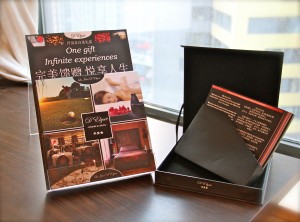D’Elysee (www.delysee.com) was created in July 2010 and we delivered our first products in December 2010. As a reminder, Delysee (www.delysee.com) is a company which offers innovative giftboxes of activities for each festival and business occasion. Inside each giftbox, the person who receives the box can choose among a choice of 12 to 60 activities for free because it has been prepaid. We work with Park Hyatt, Westin, Room Beijing, Eric Paris, bakeries, wines in China, etc. Our first client mislead us a little bit on our product lines since it asked for giftboxes of 3000 and 6000 RMB which was not where the main market was even though part of it was in the highest levels of prices. It took then 6 months to develop 5 new products with prices ranging from 188 until 888 RMB with the intermediary prices of 376 and 520 RMB. Now, our products are much more affordable and it made it possible to enlarge our clients basis. We entered about 18 points of sales last summer in order to be present in BtoC and get known as well in BtoB (indirectly). The shops in China where you can find our products are the ex O2 bookstore in Zhunguanxun, shuangjng for instance but also the shop Home Plus in Joy city. Since then, we have partners in 6 cities: Beijing, Shanghai, Guangzhou, Tianjin, Wuhan, Hangzhou, making it possible to sell in 6 cities sooner or later.
Our main current issue is to recruit promising profiles to sell in BtoB to companies. An ESOP program is in process to give shares to promising people joining us. The objective is to attract ambitious people who want to become managers and grow with the business at the same time as Google, Apple and many companies did in order to reward the best of the best. Experience is important but the will to make it work is crucial.
In order to develop our concepts and brands, we have participated in many fairs and events. We sponsored a CEO event in Beida and gave a giftbox of wines to the CEO of Aiguo, the CEO of Toredo, some VC funds . We also participated in the Beijing Cultural fair or the French Chamber of commerce gala as well as other events with Foreign companies also. Each event has been useful for us and lead to orders from companies or individuals. With one event, we target between 1,000 and 8,000 people. Giving our products to the right person at the right timing is a very powerful tool to get back and making popular our products. You have to share in order to receive back.
Time is a key issue. The more time you spend in Beijing, the more you know people (if you go out and make the efforts of meeting with people) and the more opportunities appear. We got invented by officials to the fair we began to know about a year ago (it takes time to establish trust) because they liked our products but also because we were making the fair more international and innovative. At the same time, the marketing should be clear about what you do so that people can remember what you do and when they need you. For instance, we try to make it clear our product is a gift so that when people need a gift, they should think about us in the future. It is important also not to scarify the long-term strategy over the short-term tactics which is very tempting. It should have been also essential to perform a deeper market research in China with focus groups in china and mystery shopping in China to get accurate information and build an accurate strategy in China.
The BtoC market is more difficult for several reasons but we need to be there because it is about building the recognition and the brand (called “goodwill” in finance). But the main market is naturally now the BtoB market. Selling to companies is easier, more effective and can accept higher volumes.
I have thought a lot about the differences between start-ups in China and start-ups in the West and there are indeed many differences. For instance, the structure of costs is totally different. For example, the marketing in China is way more expensive than in Europe. Let’s take some examples on the internet: marketing in China online a product will cost 60,000 RMB to open an account on Tmall and 150,000 RMB of deposit. And if you are not on Tmall, you miss 80% of the sales in China. In Europe, no website has such a power as Taobao. Google ranking system is easier to understand than Baidu. On the other hand, the costs of production and material is much lower in China. That is way, it is quite difficult for foreigners to price accurately a business plan. The most costly item in the Business Plan is the access to clients either in btob or btoc. The access to malls is also prohibitive for a lot of start-ups. As a consequence, when you start a business in China, you need to be backed by VCs. Moreover, with the very high growth China is experiencing, it worths spending a lot in marketing to get known because with 10% of growth, you know that if people know you, they will certainly buy somewhere and some time. That leads to situations where VCs spend dozens of millions without earning one penny for years whereas European VCs will look for a shorter return. I think a similar issue will be faced by Chinese companies in the west. They will certainly be amazed by the high level of salaries, social charges and productions as well as the low cost of marketing. That is way, starting a business in a foreign country requires for the manager to meet a lot of people and talk, talk, talk … in order to first gather the best team and gather the more info. An issue which is both in the West and in China is to find a team. Often, entrepreneurs are people who have nothing to lose: either they have enough money (so nothing to lose), either they have none (so nothing to lose). In both cases, there is a trade-off to start a business. The difficulty is to convince people who do have a good job and are professionals to join a start-up because they may slow down their career if the business of the start-up does not take off substantially and do not have the luxury to wait. An other category of entrepreneurs are people who start a business by “mindset” or values even though they could have a good job in consulting, banks or other industries. This is where MBAs are. I would tell they are more idealistic about freedom and usefulness to others, enthusiastic and risk-takers. This is among these 3 kinds of people you have to build a team at the beginning. It is never easy.
Actually, even though it is hard to accept, my feeling is that a large part of our success in corporate life is linked to chance and the ability, when chance appears to grab it in order to ultimately transform it into an opportunity. This is what happened when I met Franck Nazikian, the founder and organizer of CHNICT which is the biggest tech event in China gathering worldwide CEOs, COOs and founders of leading tech companies such as Eduardo Saverin from Facebook, Robin Li from Baidu or Thibault Villet from Glamour Sales. We were quickly able to work on different projects together. I was especially enthusiastic to join such an event with a global reach based in the new silicon valley: Beijing.
It was also a matter of chance and opportunity when I decided to create Daxue Consulting with some friends from different backgrounds. Daxue was created in order to help foreign companies to understand China and Chinese companies to understand the West at a better price and with more accurate figures than existing consulting firms in china (with methodologies such as focus group in China, interviews in China, business trip in China, market research in China, entry strategy in China). The idea is to perform market research in China with students (MBAs, PhD,s, CFAs, CPAs, Masters) to give insights on a market to these companies. Once again, it was a matter of people, about connecting people to make them become great consultants in China to provide outstanding consulting in China.
As a CEO of a start-up, I meet a lot of other businesses. We see many opportunities but also people who are recruiting, looking for partnerships, etc … we are in the middle of flows of information between China, Europe and the US as well as inside China. I would like to build other teams on other projects. I would be happy personally to share and introduce businesses to people who are serious about starting a business and joining teams in SME or start-ups. Professors are also in the middle of flows of information and that would be wonderful to exchange with MBAs to put our professors on the boards of our young companies. I think as MBAs, we should not be shy to share about ideas, concepts, business models and values we believe in, in a generous way simply because ideas are nothing (and everyone has good ideas), execution is everything. With a good team, we can go very far ; on the other hand alone, you will never catch the train.
May 2012 Beijing
Matthieu David (ex CEO Delysee)








